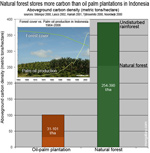Orangutan should become symbol of palm-oil opposition
Orangutan should become symbol of palm-oil opposition
Rhett A. Butler, mongabay.com
January 2, 2008
Organutans could serve as a symbol to unite conservationists against damaging palm-oil production.
In a letter published today in Nature, Oscar Venter, Erik Meijaard and Kerrie Wilson argue that proposals for conservation groups to purchase and run oil palm plantations for the purpose of generating funds for forest protection are unlikely to be successful. The concept was originally put forth by Lian Pin Koh and David S. Wilcove in a 2007 Nature article.
Venter and colleagues say that because Indonesian NGOs are too small to fund and operate plantations or parks, they should “combine a range of approaches to conservation, in order to maximize their influence through strategic alliances” with local communities, carbon traders, and the palm-oil industry itself. Reserves should be a secondary strategy for local conservationists, say the authors.

Orangutan in Borneo |
“Reserves should be purchased only if and when doing so is a more cost-effective means of conserving biodiversity than any of the available alternatives: that is, when resources are available, the benefits are substantial and the alternatives are limited,” the authors write.
The authors say NGOs should also pressure palm-oil producers by “increasing consumer awareness of the impact of palm-oil production on biodiversity — particularly on orangutans.” Using the demise of the orangutan as a symbol for destructive palm-oil practices, conservationists may be able to reduce demand for palm-oil and force the industry to make greener reforms.
“The NGOs involved must move on to foster relationships that simultaneously work both with and against the palm-oil industry to limit its impact,” the authors conclude.
Environmentalists say palm-oil production is driving deforestation across southeast Asia. Oil palm estates have expanded in Indonesia from 600,000 hectares in 1985 to more than 6 million hectares in 2007. In Sabah and Sarawak (Malaysian Borneo), the area of plantations has increased from 186,744 hectares in Sabah and Sarawak in 1984 to 1,673,721 hectares at the close of 2003. Scientists estimate the use of palm oil biodiesel from plantations established on peat soils releases 8 to 21 times the carbon dioxide emissions as conventional diesel fuel.
Related articles
Kyoto pact ignores CO2 emissions from biofuels
(12/5/2007) The Kyoto climate pact, as it currently stands, ignores millions of tons of carbon dioxide emissions from the drainage of peatsoils for palm oil production in Indonesia and Malaysia, warnned Wetlands International, an international NGO, in a report released at the UN climate meeting in Bali.
UN says palm oil destroys forests, indigenous cultures in Indonesia, Malaysia
(11/26/2007) Europe’s demand for supposedly eco-friendly biodiesel is fueling destruction of biodiverse rainforests in southeast Asia, warns a new report from the United Nations Development Programme (UNDP).
Palm oil industry announces “eco” standards for production
(11/26/2007) Palm oil producers — under fire from environmentalists who say the industry is driving the wholesale destruction of biodiverse rainforests in Malaysia and Indonesia — last week announced a new certification process to ensure greener environmental standards for palm oil, reports Reuters.
Is the oil-palm industry using global warming to mislead the public?
(11/23/2007) Members of the Indonesian Palm Oil Commission are distributing materials that misrepresent the carbon balance of oil-palm plantations, according to accounts from people who have seen presentations by commission members. These officials are apparently arguing that oil-palm plantations store and sequester many times the amount of CO2 as natural forests, and therefore that converting forests for plantations is the best way to fight climate change. In making such claims, these Indonesian representatives evidently are ignoring data that show the opposite, putting the credibility of the oil-palm industry at risk, and undermining efforts to slow deforestation and rein in greenhouse gas emissions.
Carbon offset returns beat forest conversion for agriculture in Indonesia
(11/21/2007) Conversion of forests and peatlands for agriculture in Indonesia has generated little economic benefit while releasing substantial amounts of greenhouse gases into the atmosphere, reports a new study from the the World Agroforestry Centre (ICRAF), the Center for International Forestry Research (CIFOR) and their Indonesian partners.
Greenwashing the palm oil industry
(11/12/2007) A new report from Greenpeace alleges that members of the Roundtable on Sustainable Palm Oil — an industry-driven initiative to clean up palm oil production — are using palm oil derived by clearing endangered rainforests and draining carbon-rich peatlands on the Indonesian island of Sumatra.
 |
Oil palm does not store more carbon than forests
(11/8/2007) Officials from the Indonesian ministry of agriculture and the palm oil industry are distributing materials that misrepresent the carbon balance oil palm plantations, according to accounts from people who have seen presentations by members of the Indonesian Palm Oil Commission. Ministry of agricultural officials are apparently arguing that oil palm plantations store and sequester many times the amount of CO2 as natural forests and therefore converting forests for plantations is the best way to fight climate change. In making such claims, these Indonesian officials are ignoring data that show the opposite, putting the credibility of the oil palm industry at risk, and undermining efforts to slow deforestation and reign in greenhouse gas emissions.
 |
Does palm oil alleviate rural poverty in Malaysia?
(10/23/2007) While it is often argued that the economic benefits of oil palm plantations outweigh the environmental costs of converting biodiverse ecosystems to monocultures, new analysis suggests that the role of plantations in reducing rural poverty may be overstated.
NGOs should use palm oil to drive conservation
(8/29/2007) Environmentalists view the expansion of oil palm plantations in southeast Asia as one of the greatest threats to the region’s forests and biodiversity. Campaigners say oil palm is driving the conversion of tens of thousands of hectares of peatlands and lowland forest in Indonesia and Malaysia, putting wildlife at risk, increasing the vulnerability of the forests to fires, and triggering large emissions of greenhouse gases. Pressure from these groups have in recent months convinced European policymakers to reconsider sourcing energy crop production to the region.
 |
98% of orangutan habitat gone in next 15 years
(6/11/2007) Indonesia is losing more than 2.1 million hectares (5.2 million acres) of forest a year to illegal loggers, states a new report from the U.N. Environment Program (UNEP). The report, which estimates the value of illicit timbering at $4 billion annually, warns that 98 percent of Indonesia’s lowland forests will be gone by 2022, putting species like the orangutan at risk of extinction in the wild. The report, Last stand of the Orang-utan: State of Emergency, was released Monday at the Convention on International Trade in Endangered Species meeting in The Hague.
 |
Environmental concerns mount as palm oil production grows
(5/15/2007) The booming market for palm oil is driving record production but fueling rising concerns over the environmental impact of the supposedly “green” bioenergy source. The two leading producers of palm oil, Malaysia and Indonesia, have rapidly expanded palm oil production in recent years, often at the expense of biodiverse rainforests and carbon-rich peatlands that store billions of tons of greenhouse gases. Environmentalists say that due to these factors, burning of palm oil can at times be more damaging the global climate than the use of fossil fuels.
Palm oil doesn’t have to be bad for the environment
(4/4/2007) As traditionally practiced in southeast Asia, oil palm cultivation is responsible for widespread deforestation that reduces biodiversity, degrades important ecological services, worsens climate change, and traps workers in inequitable conditions sometimes analogous to slavery. This doesn’t have to be the case. Following examples set forth by the Roundtable on Sustainable Palm Oil and firms like Golden Hope Plantations Berhad, a Malaysian palm oil producer, oil palm can be cultivated in a manner that helps mitigate climate change, preserves biodiversity, and brings economic opportunities to desperately poor rural populations.
Eco-friendly palm oil could help alleviate poverty in Indonesia
(4/3/2007) The Associated Press (AP) recently quoted Marcel Silvius, a climate expert at Wetlands International in the Netherlands, as saying palm oil is a failure as a biofuel. This would be a misleading statement and one that doesn’t help efforts to devise a workable solution to the multiplicity of issues surrounding the use of palm oil.







